The third edition of the SDG India Index and Dashboard 2020–21 was released by NITI Aayog today. Since its inaugural launch in 2018, the index has been comprehensively documenting and ranking the progress made by States and Union Territories towards achieving the Sustainable Development Goals. Now in its third year, the index has become the primary tool for monitoring progress on the SDGs in the country and has simultaneously fostered competition among the States and Union Territories.
NITI Aayog Vice Chairperson Dr Rajiv Kumar launched the report titled, SDG India Index and Dashboard 2020–21: Partnerships in the Decade of Action, in the presence of Dr Vinod Paul, Member (Health), NITI Aayog, Shri Amitabh Kant, CEO, NITI Aayog, and Ms. Sanyukta Samaddar, Adviser (SDGs), NITI Aayog. Designed and developed by NITI Aayog, the preparation of the index followed extensive consultations with the primary stakeholders—the States and Union Territories; the UN agencies led by United Nations in India; Ministry of Statistics and Programme Implementation (MoSPI), and the key Union Ministries.
“Our effort of monitoring SDGs through the SDG India Index & Dashboard continues to be widely noticed and applauded around the world. It remains a rare data-driven initiative to rank our States and Union Territories by computing a composite index on the SDGs. We are confident that it will remain a matter of aspiration and emulation and help propel monitoring efforts at the international level,” Dr. Rajiv Kumar, Vice Chairman, NITI Aayog said during the launch.
With one-third of the journey towards achieving the 2030 Agenda behind us, this edition of the index report focuses on the significance of partnerships as its theme. Shri Amitabh Kant, CEO, NITI Aayog said, “The report reflects on the partnerships we have built and strengthened during our SDG efforts. The narrative throws light on how collaborative initiatives can result in better outcomes and greater impacts.”
On the theme of partnerships which is central to Goal 17, Dr. Vinod Paul, Member (Health), NITI Aayog, said, “It is clear that by working together we can build a more resilient and sustainable future, where no one is left behind.”
“From covering 13 Goals with 62 indicators in its first edition in 2018, the third edition covers 16 Goals on 115 quantitative indicators, with a qualitative assessment on Goal 17, thereby reflecting our continuous efforts towards refining this important tool,” said Ms. Sanyukta Samaddar, Adviser (SDGs), NITI Aayog.
NITI Aayog has the twin mandate to oversee the adoption and monitoring of the SDGs in the country, and also promote competitive and cooperative federalism among States and UTs. The index represents the articulation of the comprehensive nature of the Global Goals under the 2030 Agenda while being attuned to the national priorities. The modular nature of the index has become a policy tool and a ready reckoner for gauging progress of States and UTs on the expansive nature of the Goals, including health, education, gender, economic growth, institutions, climate change and environment.
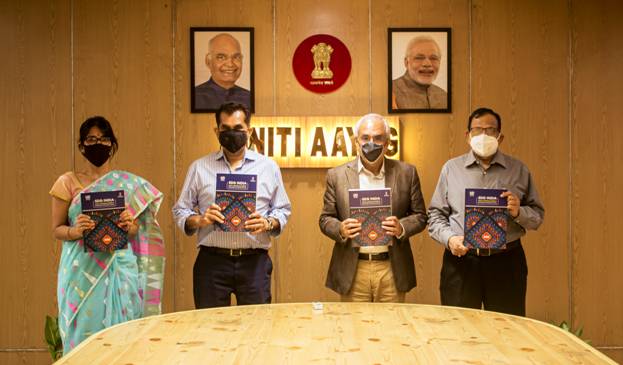
From right to left: Dr Vinod Paul, Member (Health);Dr Rajiv Kumar, Vice Chairperson; Shri Amitabh Kant, CEO; and Ms. Sanyukta Samaddar, Adviser (SDGs), NITI Aayog
SDG India Index and Dashboard 2020–21: An Introduction to the Third Edition
The SDG India Index 2020–21, developed in collaboration with the United Nations in India, tracks progress of all States and UTs on 115 indicators that are aligned to MoSPI’s National Indicator Framework (NIF). The initiative to refine and improve this important tool with each edition has been steered by the need to continuously benchmark performance and measure progress, and to account for the availability of latest SDG-related data on States and UTs. The process of selecting these 115 indicators included multiple consultations with Union Ministries. Feedback was sought from all States and UTs and as the essential stakeholder and audience of this localisation tool, they played a crucial role in shaping the index by enriching the feedback process with localised insights and experience from the ground.
The SDG India Index 2020–21 is more robust than the previous editions on account of wider coverage of targets and indicators with greater alignment with the NIF. The 115 indicators incorporate16 out of 17 SDGs, with a qualitative assessment on Goal 17,andcover 70 SDG targets. This is an improvement over the 2018–19 and 2019–20 editions of the index, which had utilised 62 indicators across 39 targets and 13 Goals, and 100 indicators across 54 targets and 16 Goals, respectively.
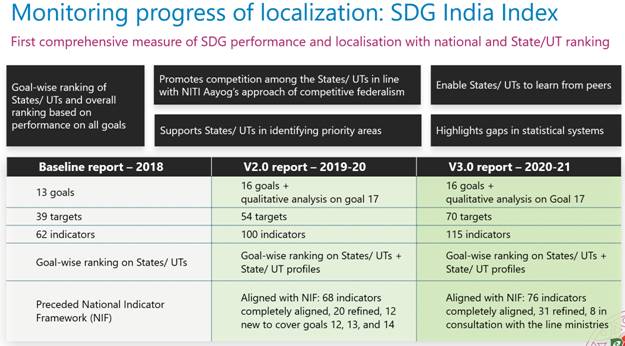
The SDG India Index computes goal-wise scores on the 16 SDGs for each State and Union Territory. Overall State and UT scores are generated from goal-wise scores to measure aggregate performance of the sub-national unit based on its performance across the 16 SDGs. These scores range between 0–100, and if a State/UT achieves a score of 100, it signifies it has achieved the 2030 targets. The higher the score of a State/UT, the greater the distance to target achieved.
States and Union Territories are classified as below based on their SDG India Index score:
- Aspirant: 0–49
- Performer: 50–64
- Front-Runner: 65–99
- Achiever: 100
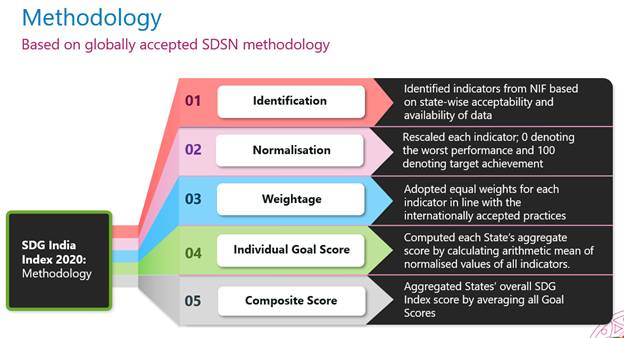
Overall Results and Findings
The country’s overall SDG score improved by 6 points—from 60 in 2019 to 66 in 2020–21. This positive stride towards achieving the targets is largely driven by exemplary country-wide performance in Goal 6 (Clean Water and Sanitation) and Goal 7(Affordable and Clean Energy), where the composite Goal scores are 83 and 92, respectively.
Goal-wise India results, 2019–20 and 2020–21:
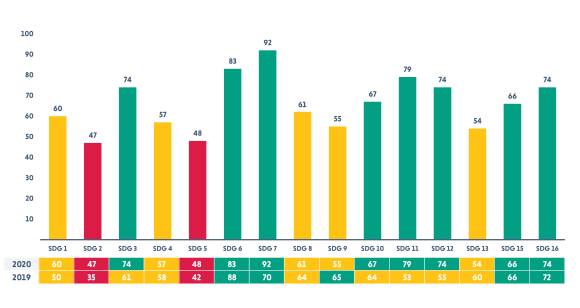
The top-fiveand bottom-fiveStates in SDG India Index 2020–21:
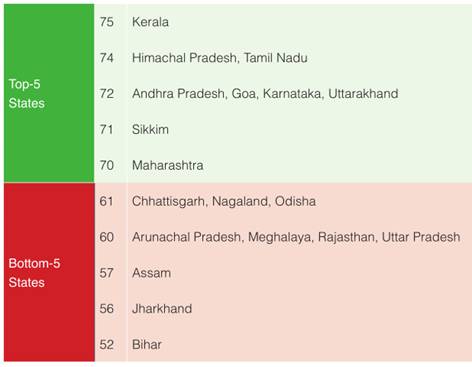
Performance and Ranking of States and UTs on SDGs 2020–21, including change in score from last year:
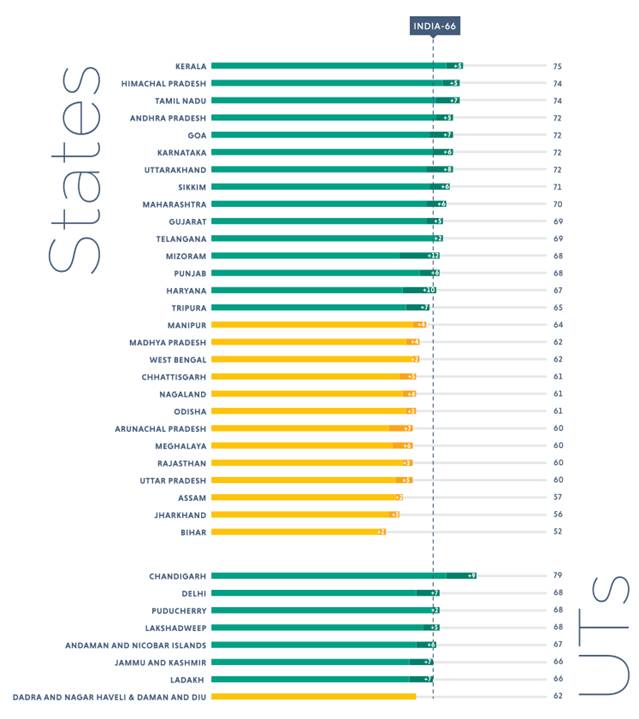
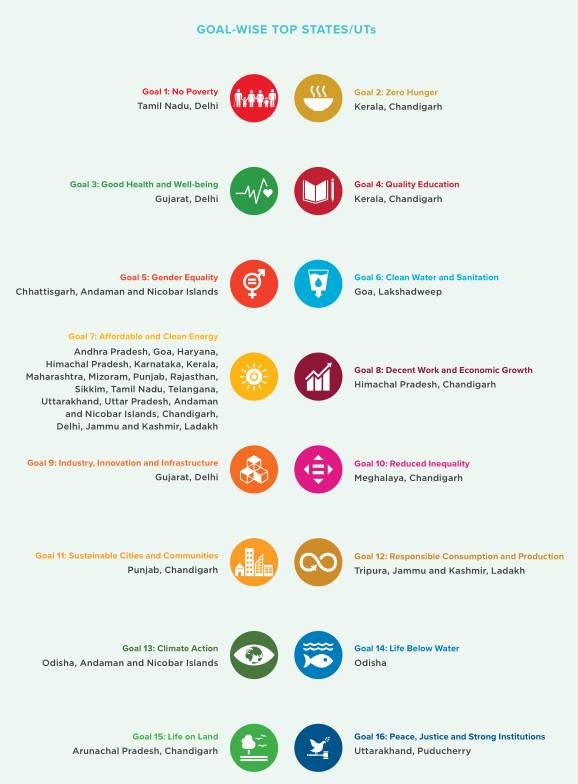
Mizoram, Haryana, and Uttarakhand are the top gainers in 2020–21in terms of improvement in score from 2019, with an increase of 12, 10 and 8 points, respectively.
Top Fast-Moving States (Score-Wise):

While in 2019, ten States/UTs belonged to the category of Front-Runners (score in the range 65–99, including both) twelve more States/UTs find themselves in this category in 2020–21. Uttarakhand, Gujarat, Maharashtra, Mizoram, Punjab, Haryana, Tripura, Delhi, Lakshadweep, Andaman and Nicobar Islands, Jammu and Kashmir and Ladakh graduated to the category of Front-Runners (scores between 65 and 99, including both).
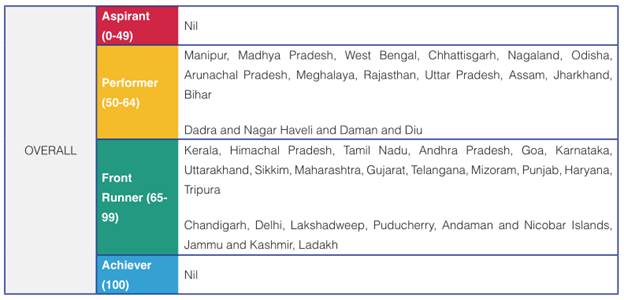
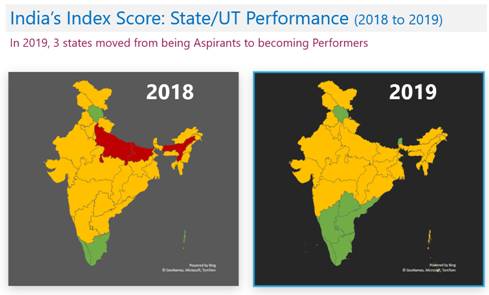
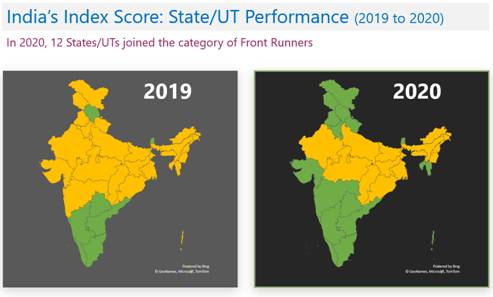
A section of the SDG India Index report is dedicated to all the 36 States and UTs of the country. These State and UT profiles will be very useful for policymakers, scholars and the general public, to analyse the performance on the 115 indicators across all Goals.
Sample of a State/UT profile from the report:
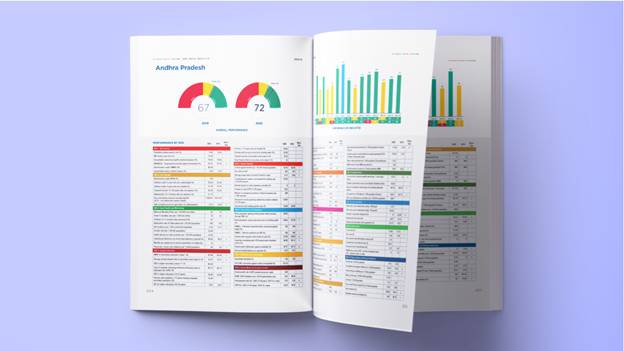
It is followed by a unique section on the progress on SDG localisation in States and Union Territories. It provides an update on the institutional structures, SDG vision documents, State and District Indicator Frameworks and other initiatives taken by the State and UT governments.
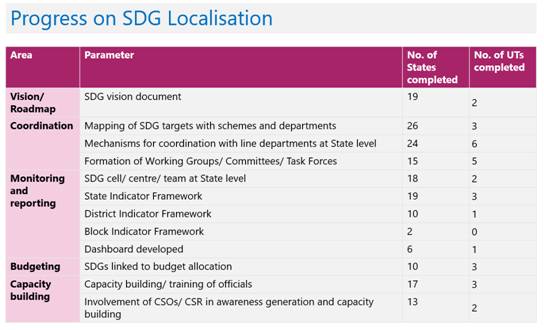
The SDG India Index2020–21 is also live on an online dashboard, which has cross-sectoral relevance across policy, civil society, business, and academia. The index is designed to function as a tool for focused policy dialogue, formulation and implementation through development actions, which are pegged to the globally recognisable metric of the SDG framework. The index and dashboard will also facilitate in identifying crucial gaps related to tracking the SDGs and the need for India to develop its statistical systems at the State/UT levels. As another milestone in the SDG localisation journey of the country, the Index is presently being adapted and developed by NITI Aayogatthe granular level of districts for the upcoming North Eastern Region District SDG Index.
A snapshot of the SDG India Index 2020–21 dashboard:
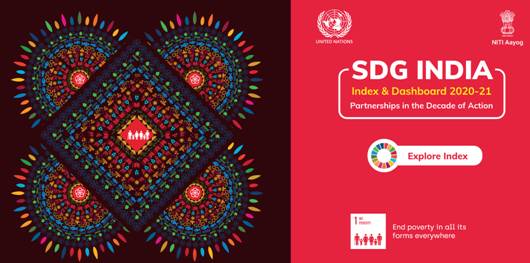
NITI Aayog has the mandate for coordinating the adoption and monitoring of SDGs at the national and sub-national levels. The SDG India Index and Dashboard represents NITI Aayog’s efforts inencouraging evidence-based policymaking by supporting States and UTs to benchmark their progress, identify the priority areas and share good practices.
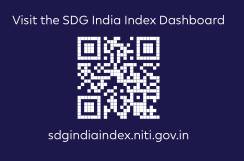
The full SDG India Index report can be accessed here: https://wgz.short.gy/SDGIndiaIndex
The interactive dashboard can be accessed here: http://sdgindiaindex.niti.gov.in/
